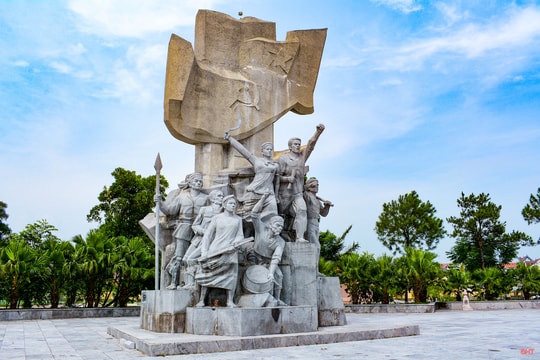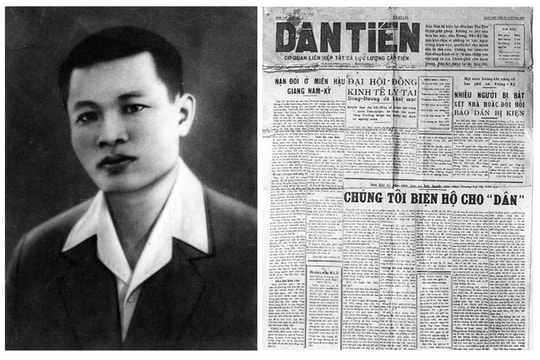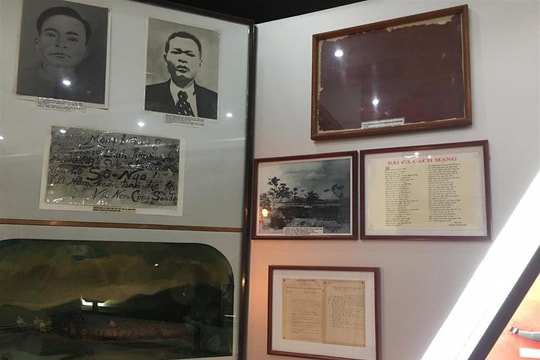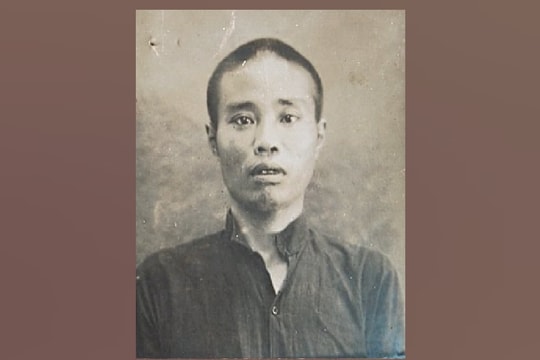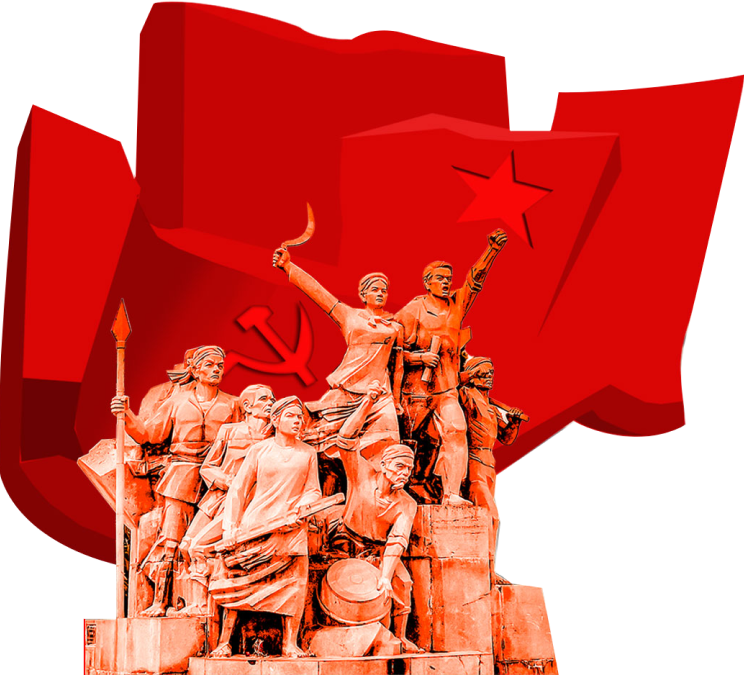Comrade Dang Chinh Ky (1890 - 1931): A shining example of revolutionary enthusiasm
Dang Chinh Ky's outstanding achievements in the Nghe Tinh Soviet movement and throughout his entire career were propaganda, training, and agitation work with special marks through immortal poems.
During the Nghe Tinh Soviet movement, tens of thousands of party members, cadres and revolutionary masses in the two provinces of Nghe An and Ha Tinh knew by heart the "Revolutionary Song" with its passionate and heroic verses that urged people's hearts:
“My laboring brothers and sisters,
Who knows this?
It's been nearly eighty years,
Make the body of a buffalo or horse for the dog or sheep.
The Western army is cruel in many ways,
Southern people are sometimes in danger.
More oppression and greed,
The longer you are a slave, the more miserable you will be.
The author of that poem is Dang Chinh Ky (also known as Dang Duc Chem, Dang Tung Mau), born in 1890 in Hoanh Son village (now Khanh Son commune), Nam Kim commune, Nam Dan district, Nghe An province.
Dang Chinh Ky's grandfather was Dang Duc Uan, who passed the Mau Thin exam, Tu Duc 21 (1868). He was an official under Tu Duc's reign and was known for his integrity. Dang Chinh Ky's biological father was Dang Duc Hoa, because he was a mandarin's son, he was given the title "Am Tu". Although he studied Chinese for many years, he only liked to stay in the countryside and work as a doctor. His mother was Le Thi Nha, who worked hard all year round in the fields and weaved cloth. As the youngest child in the family, Dang Chinh Ky suffered many hardships and became an orphan. His father passed away when Dang Chinh Ky was only 3 years old. When he was 14, his grandfather and mother passed away one after another. From then on, Dang Chinh Ky lived with his eldest brother, a poor Confucian scholar. His sister-in-law also worked as a farmer and raised silkworms to weave cloth. Dang Chinh Ky studied while taking advantage of his time to go find firewood and pick vegetables to help his siblings. The family's real circumstances soon made Dang Chinh Ky close to and friendly with the working people in the village.
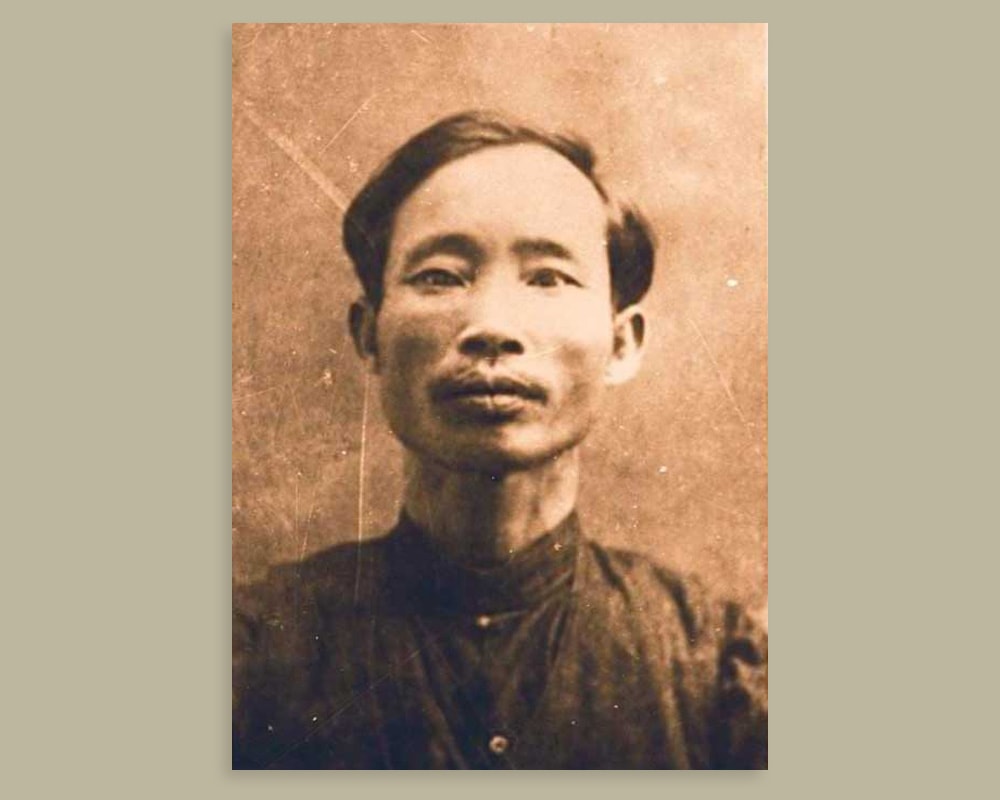
In 1907, Dang Chinh Ky was sent to Hue by the Minister of Education Cao Xuan Duc (a close friend of his grandfather) to be educated. While still in his hometown of Nam Dan, Dang Chinh Ky already had a certain amount of Chinese characters. In Hue, he learned the national language and French. Thanks to his intelligence, he could memorize a text or poem after listening to or reading it a few times. Therefore, after only a few years of diligent study, he had enough qualifications to work as a desk clerk with a salary enough to support himself and his family. However, when Mr. Cao Xuan Duc wanted to get Dang Chinh Ky a position as a judge or a clerk in Hue, he tactfully refused and returned to his hometown to open a private teaching class in Sa Nam town, Nam Dan district.
With a thirst for knowledge, while teaching, Dang Chinh Ky continued to study on his own to improve his Chinese, Vietnamese and French skills. To test himself, he also took the final provincial exam in the year of Mau Ngo (Khai Dinh 3/1918). In this exam, in addition to the Chinese poetry and literature subjects, there were also essays and math in French. Although he did not pass, through this exam, Dang Chinh Ky witnessed the end of the Chinese examination system in Vietnam, demonstrating the decline of the feudal system and the expansion of the colonial system in culture.
In 1923, Dang Chinh Ky graduated from Primère (French-Vietnamese primary school). He married Ms. Pham Thi Khuong (from Thanh Thuy village, now Nam Thanh commune, Nam Dan district) and built a house to live in his wife's hometown.
In 1924, Dang Chinh Ky went to Hue to open a school in the citadel named Thai Trach school (bringing his wife and children along). At that time, the workers' movement and the patriotic movement in the whole country rose after the event of Pham Hong Thai throwing a bomb to try to kill Governor-General Merlin in Sa Dien (Guangzhou, China (June 19, 1924).
In 1925, a movement arose demanding that the French colonialists pardon Phan Boi Chau, a famous patriotic scholar from the same hometown as Dang Chinh Ky. In 1926, a movement arose in the North and the South to hold a memorial service for Phan Chu Trinh, a patriotic scholar following the reformist trend. Day and night, Dang Chinh Ky enthusiastically worked to mobilize and organize students to participate in rallies and demonstrations with the people of the ancient capital of Hue to demand amnesty for Phan Boi Chau and to overthrow the brutal French colonial regime...
The more he hated the enemy, the more he admired Phan Boi Chau's personality and talent. Since he was exiled by the French colonialists to Hue, Dang Chinh Ky had the opportunity to visit and gradually became a close compatriot of "Old Man Ben Ngu". He knew by heart many of Phan Boi Chau's stirring poems. That further stimulated his patriotism and his innate talent for poetry and prose.
In the years 1925-1926, Marxism-Leninism began to be spread in Vietnam through Nguyen Ai Quoc's "Revolutionary Path". The Vietnam Revolutionary Youth Association (abbreviated as the Youth Association) was established in Guangzhou, China and developed grassroots organizations in many places in the country. In Nghe An, there was the Phuc Viet Association since July 14, 1925. Now there was also the Youth Association with a more active revolutionary tendency, attracting many classes to join the Association. Many Tan Viet members transferred to the Youth Association.
In Thua Thien Hue, the Youth Association also developed strongly. In early 1927, Dang Chinh Ky was admitted to the Youth Association. That was the event that marked his maturity. From then on, he devoted himself to revolutionary activities with clear directions, principles and goals. He began to infiltrate the masses, learn about the aspirations of farmers, workers and the urban poor, and used all appropriate forms to propagate and awaken national and class consciousness among the people.
Dang Chinh Ky's school was no longer simply a place to teach culture as before. He gave patriotic and revolutionary poems to teach in order to enlighten the students' sense of national self-reliance. For a long time, French secret agents had secretly followed teacher Ky. By the end of 1927, they ordered the closure of Thai Trach school and expelled the teacher back to his hometown. With that trick, they hoped to make teacher Ky afraid and abandon his ideals.
But the authorities misjudged Dang Chinh Ky's character. After being expelled to his hometown of Nam Dan, he tried to contact the revolutionary organization and was assigned to be in charge of a school at Vuong Thuc Quy church in Sen village (Kim Lien, Nam Dan). This school was established by the Central Vietnam Youth Association in July 1927, both to provide a place for poor children to study and to serve as a contact point for the Association. Before that, the school had one class, but since Mr. Ky returned, another class was opened. Having experience from his time in Hue, returning to Sen village, Dang Chinh Ky regularly instilled in his students patriotism, love for the people and the will to be a man; taught them to memorize many patriotic poems by Phan Boi Chau, the Duy Tan movement, Dong Kinh Nghia Thuc...
During the day, he was busy with school work, and at night, he visited the families of students and people in the area, using his persuasive skills to awaken national consciousness and hatred for the enemy in his compatriots. At that time, in Sen village and many neighboring villages, there were few people who did not know Mr. Ky. People respected him because he was good at Chinese, Western, and Vietnamese, and he taught his students to progress in both intelligence and morality. On the other hand, people also admired him for his integrity and his love for the country and people.
In 1929, Dang Chinh Ky received bad news that the Central Vietnam Youth Association was discovered and wanted by the French secret police, a number of key cadres were arrested, and many grassroots organizations of the Association were broken up. One morning in the fall of 1929, the Nam Dan district chief sent soldiers to search the school in Sen village. They confiscated a number of progressive books and newspapers and arrested Mr. Ky and brought him back to Vinh to hand him over to the French secret police. After several rounds of interrogation, they still could not find any specific clues, so the French secret police handed the case over to the Southern Dynasty officials for trial. The judge of Nghe An province at that time was Nguyen Khac Niem. Previously, he was a classmate of Dang Chinh Ky. He pretended to pity his friend and said: "You and I used to study under the same teacher, but now I am a "high official" and you are a "low prisoner", it is really embarrassing." He advised his friend to give up his anti-French mentality. Then he rambled on about the so-called “civilizing merits of the motherland”, about the invincible strength of the French army. And he defended himself: he was not an educated person who did not think about the country and the race; but according to him, patriotism requires knowing the “right time”, and at this time the country of An Nam could not have the right opportunity...
Although he felt uncomfortable hearing the judge's "confessions", Dang Chinh Ky tried to restrain himself from getting angry, which would be detrimental to his sentencing. He only said that he was only concerned with teaching to support his wife and children, and had not done anything that could be called opposing the government.
Because there was no concrete evidence and no testimony from the litigant, the court of the Southern Dynasty of Nghe An could not imprison Dang Chinh Ky. They handed him over to the local mandarin to be placed under house arrest.
The people of Nam Dan were much more enlightened, so no matter how tightly the local authorities tightened their control, Dang Chinh Ky still found a way to contact the revolutionary organization. He was extremely excited to learn that the revolutionary movement was growing very strongly and that the Indochinese Communist Party and Annamese Communist Party had been born. In Nghe Tinh, active elements of the Tan Viet Party had also established the Indochinese Communist Federation.
Early 1930,Phan Dinh Dong(from Luong Giai village) returned from Hue and visited Dang Chinh Ky. He advised Phan Dinh Dong to immediately join the revolutionary organization and not to return to Hue to work as secretary for Phan Boi Chau.
Since February 1930, after the establishment of the Communist Party of Vietnam, the workers' and peasants' struggle movement rose up throughout the North and South. Meanwhile, the Yen Bai riot of the Vietnam Nationalist Party broke out (February 9, 1930) and was defeated and brutally suppressed by the French colonialists. In Nghe An, the feudal colonial government arrested and sentenced many revolutionary fighters, and in particular, executed two cadres of the Nghe An General Farmers' Association at Thau Dau restaurant (Vinh), Phan Van Than and Nguyen Van Duu, on March 13, 1930.
Those terrorist acts were like adding fuel to the fire, making the masses hate the enemy even more and the struggle movement flare up even more strongly. From the beginning of May 1930, the revolutionary movement in Nghe Tinh rose to a high point, starting with a large demonstration of workers and farmers in Vinh - Ben Thuy (May 1, 1930) which was bloodily suppressed and the destruction of Ky Vien plantation in Thanh Chuong (May 1, 1930) which was also brutally terrorized.
Since becoming a communist party member, Dang Chinh Ky has been more active, printing and distributing leaflets, giving speeches, and propagandizing. He was eloquent and often attracted young people to join the movement. On August 30, 1930, Dang Chinh Ky, along with party members and cadres in the district, mobilized thousands of people to march to the district capital to protest and demand the resolution of the people's demands. District chief Le Khac Tuong had to sign the petition, which included the commitment: "Nam Dan district chief, from now on, will not harass the people anymore."
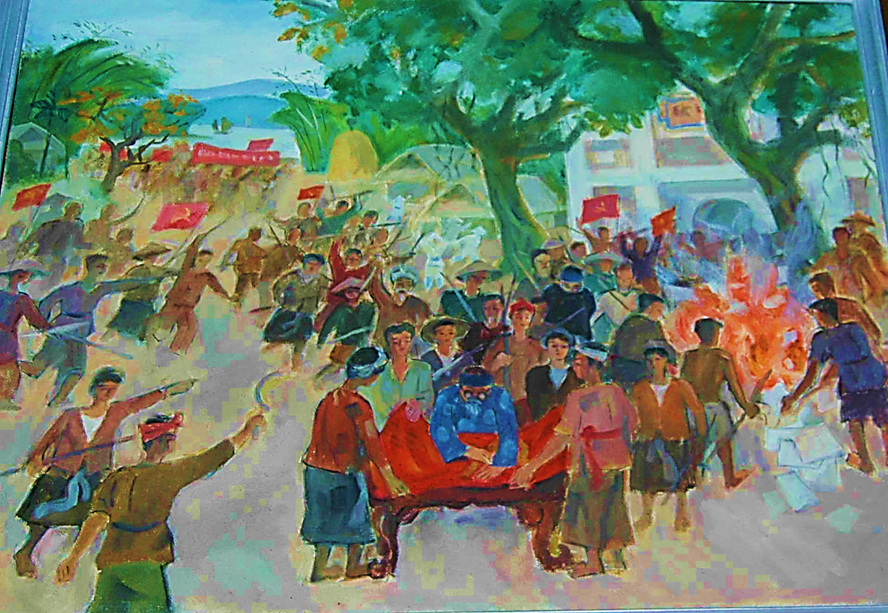
The tireless activities of Dang Chinh Ky have gained prestige among the Party Committee and the people in the district. After the first Nghe An Party Congress (October 1930), the Nam Dan Party Committee elected an official Party Executive Committee consisting of 7 members. Comrade Dang Chinh Ky was elected as the first Secretary of the Nam Dan Party Committee.
With that responsibility, Dang Chinh Ky and the Executive Committee day and night both dealt with the enemy's repression and tried to stick close to the base to build the Commune Bo Nong (Soviet government in the villages and communes) with brave red self-defense teams.
At that time (around October and November 1930), the revolutionary movement in the whole province was not yet even. While the movement in Thanh Chuong, Nam Dan, Anh Son, and Hung Nguyen districts had risen very high, the movement in Dien Chau, Yen Thanh, and Quynh Luu districts was not very strong. Therefore, the Central Region Party Committee and Nghe An Provincial Party Committee had a policy of investing good cadres in those districts. Dang Chinh Ky was assigned by Nghe An Provincial Party Committee to be in charge of the Provincial Party Committee's Propaganda and Agitation Department and was seconded to Yen Thanh and Dien Chau areas.
It was at that time that Dang Chinh Ky composed the "Revolutionary Song" to propagate and promote the revolutionary movement in districts that did not have fierce struggles like other districts:
"...Look, Ben Thuy stood up first,
Thanh Chuong stood up next.
Nam Dan, Nghi Loc, Hung Nguyen,
Mr. Son, Ha Tinh woke up.
Should I just sit and wait to die?
We must be determined together.
This commune and that commune are linked together,
Let's shout, let's shout, let's shout!
In the wind the red flag flutters straight,
White paper spread out on the ground
In the middle of the city, a battle broke out,
The other side has iron bullets, our side has golden livers...”
The poem is like a trumpet call, urging everyone to rise up and fight. It can be said that it is a symbol of the indomitable will and spirit of the Nghe Tinh Soviet.
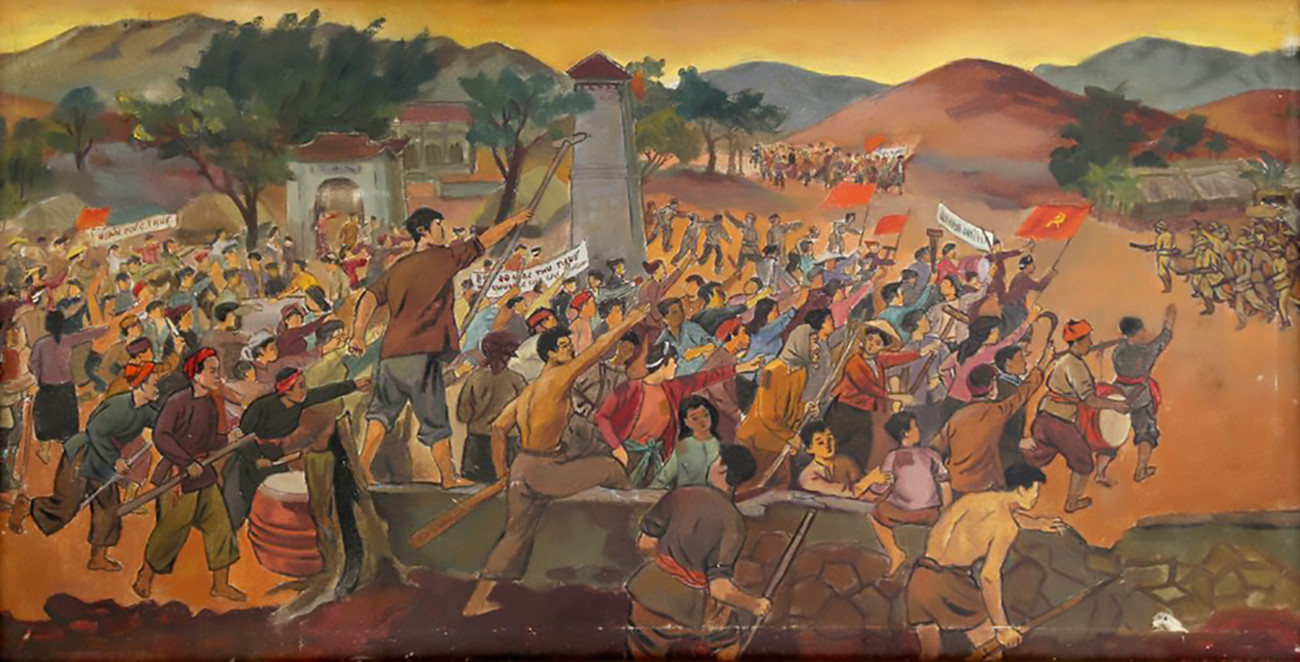
In addition to the "Revolutionary Song", Dang Chinh Ky and the cadres in the Propaganda Department of Nghe An Provincial Party Committee composed a long poem (over 100 verses) "The Call of the Indochinese Communist Party", which includes the following passage:
“...The Communist Party propagates
Marxism-Leninism
Let's cheer up the youth!
Come on ladies!
Workers, peasants and soldiers of one faction
We must agree.
Enthusiastic determination
To fight together
The final battle”
During the period of 1930-1931, the cultural level of cadres, party members and the general public was still very low, so propaganda work had a particularly important position. Dang Chinh Ky brought into full play his abilities and strengths and made a worthy contribution to the Party's propaganda and agitation work. In particular, he was also talented in public speaking. Dang Chinh Ky's essay "Talking to the Youth" had convinced the young generation in Nghe Tinh during the period of 1930-1931 and was absorbed by the people, and many people still remember it today. Here are a few excerpts:
“... What is youth? It is a young, innocent person, not willing to bow down, with a noble soul... Look, wasn't Russia in the past a dictatorial monarchy? Thanks to the Youth League sharing the burden and doing its best, Russia today has become a proletarian dictatorship. Look, wasn't Bolivia in the past a country dependent on Germany? Thanks to the Youth League beating bells and drums, awakening the sleepy soul, Bolivia today has also become a free and equal country.
Ah! How admirable are the youth! How terrifying are the youth! No matter who says the youth can move the sky, the sky will move, can shake the earth, the earth will shake... Foreign youth have firmly held the fate of society in their hands. What about the youth of our country?
...When we first went to school, our mouths read a, b, c but our minds were already filled with "hong" and "thi". When we could only mumble the words toa, moa, nong, uy, our feet were already worried about how to put on our "boots" in a fashionable way, our hands were worried about how to carry our walking sticks to look impressive. When we had already acquired the "tham" and "doc" qualities, our faces were all ablaze, looking around our family lineage, there was no one better than us. It got to the point where the chickens in the coop were painting their faces, the fish in the pot were wagging their tails. Oh, slaves, the old have not yet had time to turn their shoulders, the young slaves are already trying to pick up the burden! That is the nature of our young brothers! That is the character of our young men. It makes those who are passionate not shed tears, how can they not be angry!
We must all take care of the present situation. The flag of struggle is fluttering in the middle of the world. The wave of civil rights has spread across the four seas. I beg you, young people, to quickly stand up! Gather your courage, and be determined to sacrifice. Shed your blood to reclaim your rights, wave the red flag to repair the foundation of society.
It can be said that Dang Chinh Ky's outstanding achievements in the Nghe Tinh Soviet movement and throughout his entire career were propaganda, training, and agitation work with special marks through immortal poems.
Soviet Nghe Tinh poetry and literature are precious gems in the treasure trove of Vietnamese revolutionary literature. Dang Chinh Ky has contributed brilliant gems that will never fade into the stream of revolutionary literature.
Unfortunately, during a wave of terror by the French colonialists and their henchmen, Dang Chinh Ky was arrested and died in prison at the end of 1931, at the age of 42.
Dang Chinh Ky is a shining example of revolutionary enthusiasm, creativity, capacity and methods of propaganda and agitation. His poems and prose expressing his ambition and strong will for the communist ideal will live forever in our cause.

